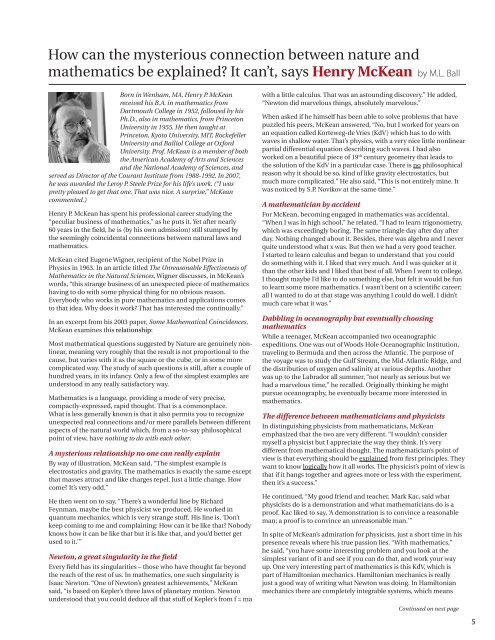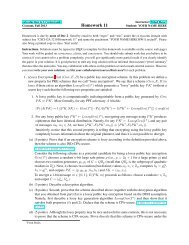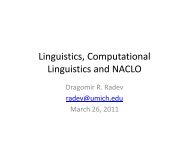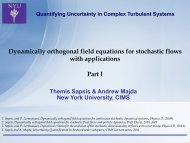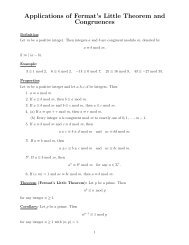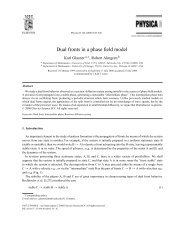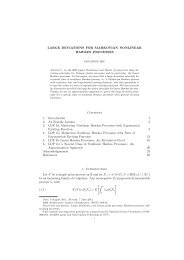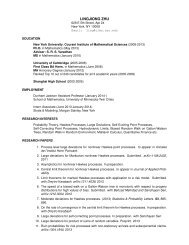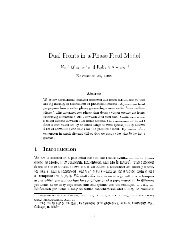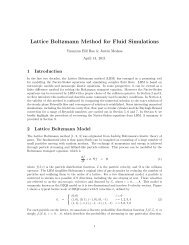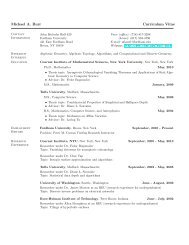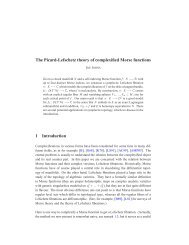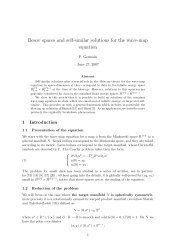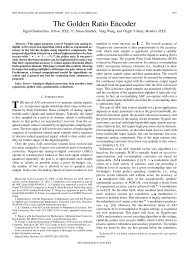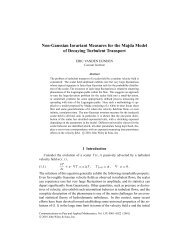Newsletter - Courant Institute of Mathematical Sciences - New York ...
Newsletter - Courant Institute of Mathematical Sciences - New York ...
Newsletter - Courant Institute of Mathematical Sciences - New York ...
You also want an ePaper? Increase the reach of your titles
YUMPU automatically turns print PDFs into web optimized ePapers that Google loves.
How can the mysterious connection between nature and<br />
mathematics be explained? It can’t, says Henry McKean by M.L. Ball<br />
Born in Wenham, MA, Henry P. McKean<br />
received his B.A. in mathematics from<br />
Dartmouth College in 1952, followed by his<br />
Ph.D., also in mathematics, from Princeton<br />
University in 1955. He then taught at<br />
Princeton, Kyoto University, MIT, Rockefeller<br />
University and Balliol College at Oxford<br />
University. Pr<strong>of</strong>. McKean is a member <strong>of</strong> both<br />
the American Academy <strong>of</strong> Arts and <strong>Sciences</strong><br />
and the National Academy <strong>of</strong> <strong>Sciences</strong>, and<br />
served as Director <strong>of</strong> the <strong>Courant</strong> <strong>Institute</strong> from 1988-1992. In 2007,<br />
he was awarded the Leroy P. Steele Prize for his life’s work. (“I was<br />
pretty pleased to get that one. That was nice. A surprise,” McKean<br />
commented.)<br />
Henry P. McKean has spent his pr<strong>of</strong>essional career studying the<br />
“peculiar business <strong>of</strong> mathematics,” as he puts it. Yet after nearly<br />
60 years in the field, he is (by his own admission) still stumped by<br />
the seemingly coincidental connections between natural laws and<br />
mathematics.<br />
McKean cited Eugene Wigner, recipient <strong>of</strong> the Nobel Prize in<br />
Physics in 1963. In an article titled The Unreasonable Effectiveness <strong>of</strong><br />
Mathematics in the Natural <strong>Sciences</strong>, Wigner discusses, in McKean’s<br />
words, “this strange business <strong>of</strong> an unexpected piece <strong>of</strong> mathematics<br />
having to do with some physical thing for no obvious reason.<br />
Everybody who works in pure mathematics and applications comes<br />
to that idea. Why does it work? That has interested me continually.”<br />
In an excerpt from his 2003 paper, Some <strong>Mathematical</strong> Coincidences,<br />
McKean examines this relationship:<br />
Most mathematical questions suggested by Nature are genuinely nonlinear,<br />
meaning very roughly that the result is not proportional to the<br />
cause, but varies with it as the square or the cube, or in some more<br />
complicated way. The study <strong>of</strong> such questions is still, after a couple <strong>of</strong><br />
hundred years, in its infancy. Only a few <strong>of</strong> the simplest examples are<br />
understood in any really satisfactory way.<br />
Mathematics is a language, providing a mode <strong>of</strong> very precise,<br />
compactly-expressed, rapid thought. That is a commonplace.<br />
What is less generally known is that it also permits you to recognize<br />
unexpected real connections and/or mere parallels between different<br />
aspects <strong>of</strong> the natural world which, from a so-to-say philosophical<br />
point <strong>of</strong> view, have nothing to do with each other.<br />
A mysterious relationship no one can really explain<br />
By way <strong>of</strong> illustration, McKean said, “The simplest example is<br />
electrostatics and gravity. The mathematics is exactly the same except<br />
that masses attract and like charges repel. Just a little change. How<br />
come? It’s very odd.”<br />
He then went on to say, “There’s a wonderful line by Richard<br />
Feynman, maybe the best physicist we produced. He worked in<br />
quantum mechanics, which is very strange stuff. His line is, ‘Don’t<br />
keep coming to me and complaining: How can it be like that? Nobody<br />
knows how it can be like that but it is like that, and you’d better get<br />
used to it.’”<br />
<strong>New</strong>ton, a great singularity in the field<br />
Every field has its singularities – those who have thought far beyond<br />
the reach <strong>of</strong> the rest <strong>of</strong> us. In mathematics, one such singularity is<br />
Isaac <strong>New</strong>ton. “One <strong>of</strong> <strong>New</strong>ton’s greatest achievements,” McKean<br />
said, “is based on Kepler’s three laws <strong>of</strong> planetary motion. <strong>New</strong>ton<br />
understood that you could deduce all that stuff <strong>of</strong> Kepler’s from f = ma<br />
with a little calculus. That was an astounding discovery.” He added,<br />
“<strong>New</strong>ton did marvelous things, absolutely marvelous.”<br />
When asked if he himself has been able to solve problems that have<br />
puzzled his peers, McKean answered, “No, but I worked for years on<br />
an equation called Korteweg-de Vries (KdV) which has to do with<br />
waves in shallow water. That’s physics, with a very nice little nonlinear<br />
partial differential equation describing such waves. I had also<br />
worked on a beautiful piece <strong>of</strong> 19 th century geometry that leads to<br />
the solution <strong>of</strong> the KdV in a particular case. There is no philosophical<br />
reason why it should be so, kind <strong>of</strong> like gravity electrostatics, but<br />
much more complicated.” He also said, “This is not entirely mine. It<br />
was noticed by S.P. Novikov at the same time.”<br />
A mathematician by accident<br />
For McKean, becoming engaged in mathematics was accidental.<br />
“When I was in high school,” he related, “I had to learn trigonometry,<br />
which was exceedingly boring. The same triangle day after day after<br />
day. Nothing changed about it. Besides, there was algebra and I never<br />
quite understood what x was. But then we had a very good teacher.<br />
I started to learn calculus and began to understand that you could<br />
do something with it. I liked that very much. And I was quicker at it<br />
than the other kids and I liked that best <strong>of</strong> all. When I went to college,<br />
I thought maybe I’d like to do something else, but felt it would be fun<br />
to learn some more mathematics. I wasn’t bent on a scientific career;<br />
all I wanted to do at that stage was anything I could do well. I didn’t<br />
much care what it was.”<br />
Dabbling in oceanography but eventually choosing<br />
mathematics<br />
While a teenager, McKean accompanied two oceanographic<br />
expeditions. One was out <strong>of</strong> Woods Hole Oceanographic Institution,<br />
traveling to Bermuda and then across the Atlantic. The purpose <strong>of</strong><br />
the voyage was to study the Gulf Stream, the Mid-Atlantic Ridge, and<br />
the distribution <strong>of</strong> oxygen and salinity at various depths. Another<br />
was up to the Labrador all summer, “not nearly as serious but we<br />
had a marvelous time,” he recalled. Originally thinking he might<br />
pursue oceanography, he eventually became more interested in<br />
mathematics.<br />
The difference between mathematicians and physicists<br />
In distinguishing physicists from mathematicians, McKean<br />
emphasized that the two are very different. “I wouldn’t consider<br />
myself a physicist but I appreciate the way they think. It’s very<br />
different from mathematical thought. The mathematician’s point <strong>of</strong><br />
view is that everything should be explained from first principles. They<br />
want to know logically how it all works. The physicist’s point <strong>of</strong> view is<br />
that if it hangs together and agrees more or less with the experiment,<br />
then it’s a success.”<br />
He continued, “My good friend and teacher, Mark Kac, said what<br />
physicists do is a demonstration and what mathematicians do is a<br />
pro<strong>of</strong>. Kac liked to say, ‘A demonstration is to convince a reasonable<br />
man; a pro<strong>of</strong> is to convince an unreasonable man.’”<br />
In spite <strong>of</strong> McKean’s admiration for physicists, just a short time in his<br />
presence reveals where his true passion lies. “With mathematics,”<br />
he said, “you have some interesting problem and you look at the<br />
simplest variant <strong>of</strong> it and see if you can do that, and work your way<br />
up. One very interesting part <strong>of</strong> mathematics is this KdV, which is<br />
part <strong>of</strong> Hamiltonian mechanics. Hamiltonian mechanics is really<br />
just a good way <strong>of</strong> writing what <strong>New</strong>ton was doing. In Hamiltonian<br />
mechanics there are completely integrable systems, which means<br />
Continued on next page<br />
5


